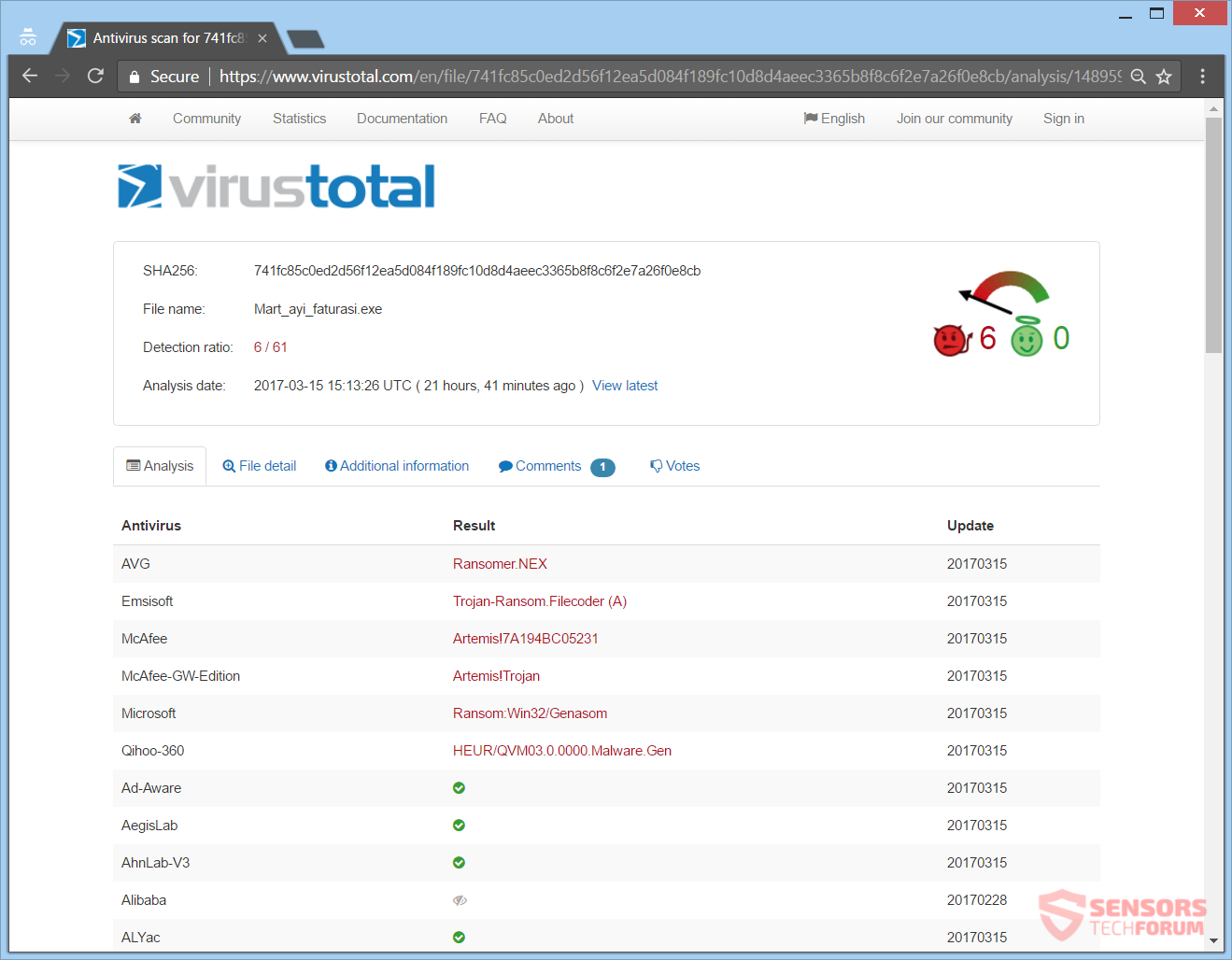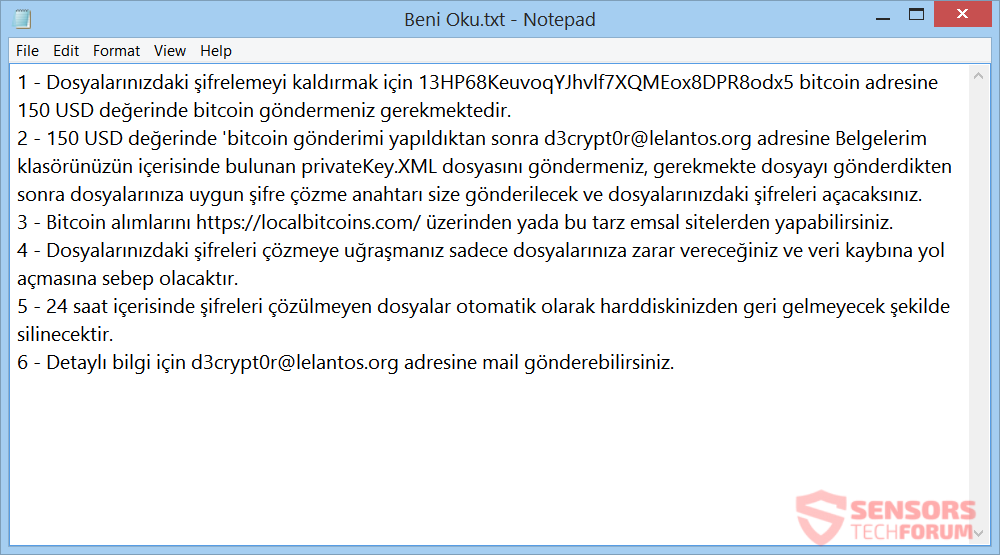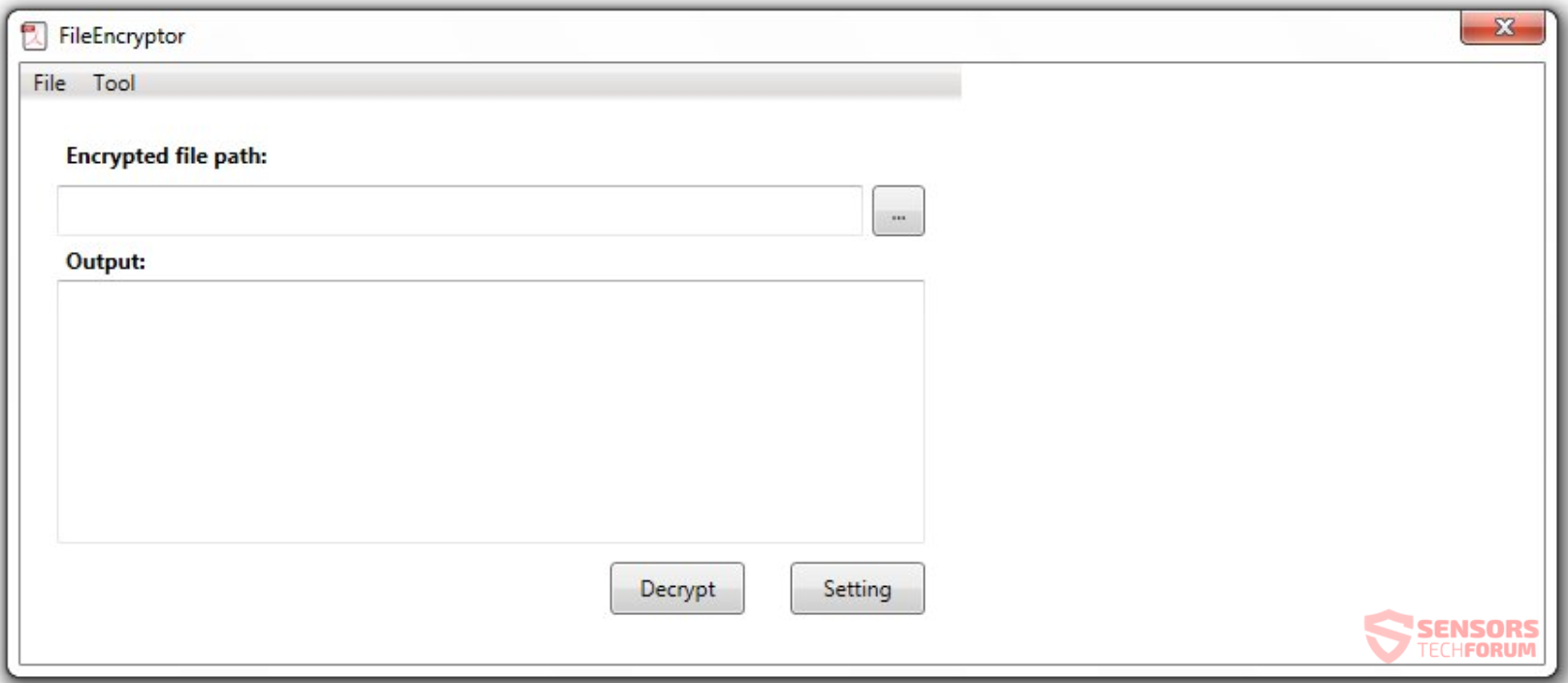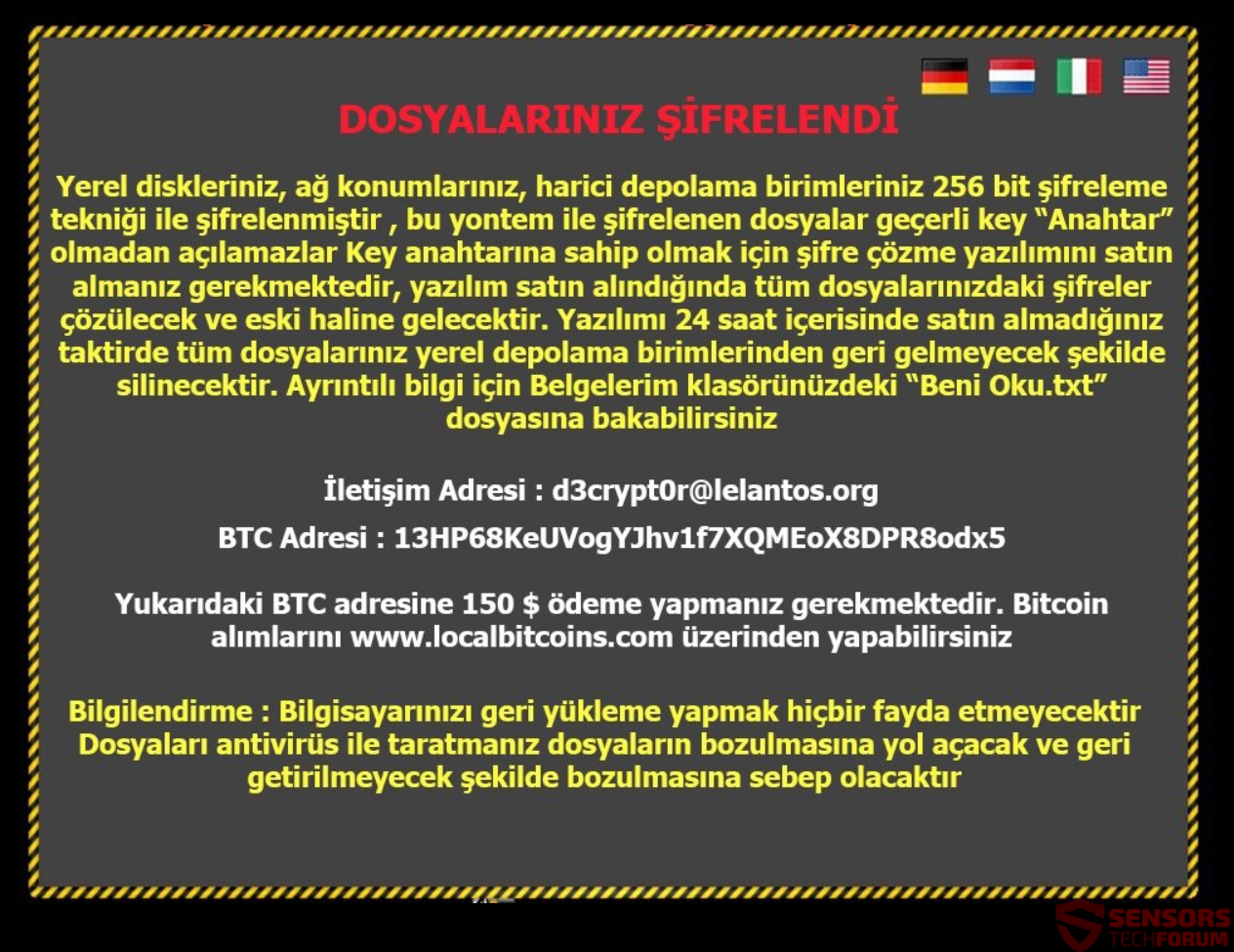
This article will aid you to remove Beni Oku.txt virus effectively. Follow the ransomware removal instructions at the end of the article.
Beni Oku.txt is the name of a ransom note used by a new Turkish ransomware cryptovirus, which is believed to be targeting mainly Turkish users. That does not exclude the possibility of other people becoming victims of the virus and getting their files encrypted. The ransom note looks like the one of CTB-Locker. The Beni Oku.txt virus will encrypt files and add the .encrypted extension to them. Read the article to find out ways in which you could potentially restore some of your files.

Threat Summary
| Name | Beni Oku.txt Virus |
| Type | Ransomware |
| Short Description | The ransomware will encrypt all of your important files and show a ransom note in Turkish, giving out details about the ransom payment. |
| Symptoms | The ransomware will encrypt files with the .encrypted extension appended to every file. |
| Distribution Method | Exploit Kits, Spam Emails, File Sharing Networks |
| Detection Tool |
See If Your System Has Been Affected by malware
Download
Malware Removal Tool
|

Beni Oku.txt Virus – Delivery Methods
Beni Oku.txt ransomware might be using targeted attacks to mainly infect users, who speak Turkish, but other delivery methods are not an exclusion. The payload file which initiates the malicious script for this ransomware is being spread around the Internet, and one of the samples was found by the malware researcher Jakub Kroustek, who uploaded it for analysis on the VirusTotal portal. You can preview the detections from the service right down here:
Beni Oku.txt ransomware might also deliver its payload file via social media networks and file-sharing services. Freeware which is found on the Web can be presented as helpful also be hiding the malicious script for the cryptovirus. Refrain from opening files right after you have downloaded them. You should first scan them with a security tool, while also checking their size and signatures for anything that seems out of the ordinary.

Beni Oku.txt Virus – A Closer Look
Beni Oku.txt is actually the name of the ransom note file with instructions that this Turkish ransomware creates. Easily it can be said that it targets mainly Turkish users, because of the usage of that language, alas that does not exclude users who speak other languages. You can preview the contents of that “Beni Oku.txt” file from the picture right here:
The above note states:
1 – Dosyalarınızdaki şifrelemeyi kaldırmak için 13HP68KeuvoqYJhvlf7XQMEox8DPR8odx5 bitcoin adresine 150 USD değerinde bitcoin göndermeniz gerekmektedir.
2 – 150 USD değerinde ‘bitcoin gönderimi yapıldıktan sonra d3crypt0r@lelantos.org adresine Belgelerim klasörünüzün içerisinde bulunan privateKey.XML dosyasını göndermeniz, gerekmekte dosyayı gönderdikten sonra dosyalarınıza uygun şifre çözme anahtarı size gönderilecek ve dosyalarınızdaki şifreleri açacaksınız.
3 – Bitcoin alımlarını https://localbitcoins.com/ üzerinden yada bu tarz emsal sitelerden yapabilirsiniz.
4 – Dosyalarınızdaki şifreleri çözmeye uğraşmanız sadece dosyalarınıza zarar vereceğiniz ve veri kaybına yol açmasına sebep olacaktır.
5 – 24 saat içerisinde şifreleri çözülmeyen dosyalar otomatik olarak harddiskinizden geri gelmeyecek şekilde silinecektir.
6 – Detaylı bilgi için d3crypt0r@lelantos.org adresine mail gönderebilirsiniz.
A rough translation of that in English is the following:
1 – To remove the encryption on your files, you need to send bitcoin to the address of 13HP68KeuvoqYJhvlf7XQMEox8DPR8odx5 bitcoin with a value of 150 USD.
2-150 worth USD ‘after Bitcoin transmission to send the privatekey.xml file located in your My Documents folder to address d3crypt0r@lelantos.org, after you send the file to need the appropriate password to your file decryption key will be sent to you and you will open your passwords in your file.
3 – Bitcoin purchases can be done through https://localbitcoins.com/ from these comparable sites.
4 – Trying to resolve the passwords in your files will only cause damage to your files and cause data loss.
Within 5 – 24 hours, unencrypted files will be deleted automatically so that they will not come back from your hard disk.
6 – For more information, you can send an e-mail to d3crypt0r@lelantos.org.
The Beni Oku.txt ransomware could make entries in the Windows Registry to achieve persistence, and probably launch or repress processes in a Windows environment. Such entries are typically designed in a way to launch the virus automatically with each start of the Windows operating system like the example given below:
SOFTWARE\Microsoft\Windows\CurrentVersion\Run
Another ransom note message is generated, which is inside an image, that looks very similar to those of the CTB-Locker and CTB-Faker ransomware viruses. That message is again written in the Turkish language. You will see that message from the image shown down here:
The original text of the message reads:
DOSYALARINIZ ŞİFRELENDİ
Yerel diskleriniz, ağ konumlarınız, harici depolama birimleriniz 256 bit şifreleme
tekniği ile şifrelenmiştir, bu yöntem ile şifrelenen dosyalar geçerli key “Anahtar”
olmadan açılamazlar Key anahtarına sahip olmak için şifre çözme yazılımını satın
almanız gerekmektedir, yazılım satın alındığında tüm dosyalarınızdaki şifreler
çözülecek ve eski haline gelecektir. Yazılımı 24 saat içerisinde satın almadığınız
taktirde tüm dosyalarınız yerel depolama birimlerinden geri gelmeyecek şekilde
silinecektir. Ayrıntılı bilgi için Belgelerim klasörünüzdeki “Beni Oku.txt”
dosyasına bakabilirsiniz
İletişim Adresi: d3crypt0r@lelantos.org
BTC Adresi : 13HP68KeUVogYJhvlf7XQMEoX8DPR8odx5
Yukarıdaki BTC adresine 150 $ ödeme yapmanız gerekmektedir. Bitcoin
alımlarını www.localbitcoins.com üzerinden yapabilirsiniz
Bilgilendirme : Bilgisayarınızı geri yükleme yapmak hiçbir fayda etmeyecektir
Dosyaları antivirüs ile taratmanız dosyaların bozulmasına yol açacak ve geri
getirilmeyecek şekilde bozulmasına sebep olacaktır
A very rough English translation of that note will be the following:
YOUR FILES ARE ENCRYPTED
Your local disks, network locations, external storage 256-bit encryption
Encrypted with this method, the files encrypted with this method will be valid key “Key”
Purchase decryption software to have Key Key
You need to buy it, the passwords for all of your files when the software is purchased
It will be solved and it will become old. You did not purchase the software within 24 hours
If all your files will not come back from local storage
Will be deleted. For more information, see the “Read me.txt”
You can look at the file
Contact Address: d3crypt0r@lelantos.org
BTC Address: 13HP68KeUVogYJhvlf7XQMEoX8DPR8odx5
You must pay $ 150 to the above BTC address. Bitcoin
You can make purchases through www.localbitcoins.com
Information: Restoring your computer will not help
Files with antivirus will lead to the corruption of your files and back
Will cause it to malfunction
From the ransom note, we can see that Beni Oku.txt actually translates to Read me.txt. The asked ransom price is 150 US dollars, demanded to be paid out in Bitcoins to a certain address. The deadline which is given is 24 hours, before the password becomes obsolete, according to the note. The price amounts to exactly 0.123 Bitcoin at the time of writing of this article.
The e-mail address given as a contact with the crooks is d3crypt0r@lelantos.org. However, you should NOT under any circumstance contact these cybercriminals or think of paying them. Your files may not get restored, and nobody could guarantee you that. Moreover, giving money to these criminals will likely motivate them to create more ransomware or do other criminal acts.
Beni Oku.txt Virus – Encryption Process
A partial list with file extensions that the Beni Oku.txt Virus ransomware seeks to encrypt is available, and you can see some of the file extensions will end up getting encrypted right here:
→.bmp, .docx, .ini, .jpg
Other files will get encrypted as well and receive the .encrypted extension. The extension will be appended after the original extension of the files, without overwriting it. The Beni Oku.txt ransomware will lock them using a 256-bit algorithm, at least according to the ransom note.
The following three files are connected with the encryption, and also contain information about the encryption keys:
- privateKey.xml
- publicKey.xml
- [name].manifest.xml
To add to that, there is also a tool called “FileEncryptor” that is associated with the lock process that looks like the following:
The Beni Oku.txt cryptovirus is quite likely to erase all the Shadow Volume Copies from the Windows operating system by using the following command:
→vssadmin.exe delete shadows /all /Quiet
Continue to read and find out what types of ways you could try to potentially restore some of your data.

Remove Beni Oku.txt Virus and Restore .encrypted Files
If your computer machine got infected with the Beni Oku.txt ransomware, you should have some experience in malware removal. You should get rid of this ransomware as quickly as possible before it encrypts other files and spreads deeper in your used network. The recommended action for you to remove the ransomware effectively by following the step-by-step instructions guide outlaid down below.
- Step 1
- Step 2
- Step 3
- Step 4
- Step 5
Step 1: Scan for Beni Oku.txt Virus with SpyHunter Anti-Malware Tool
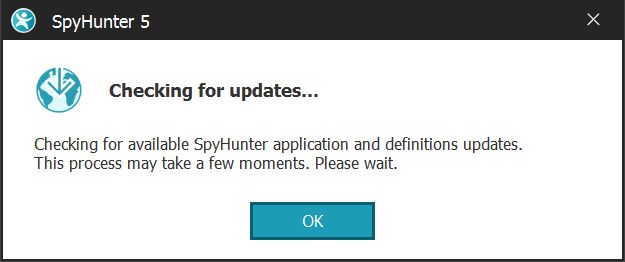
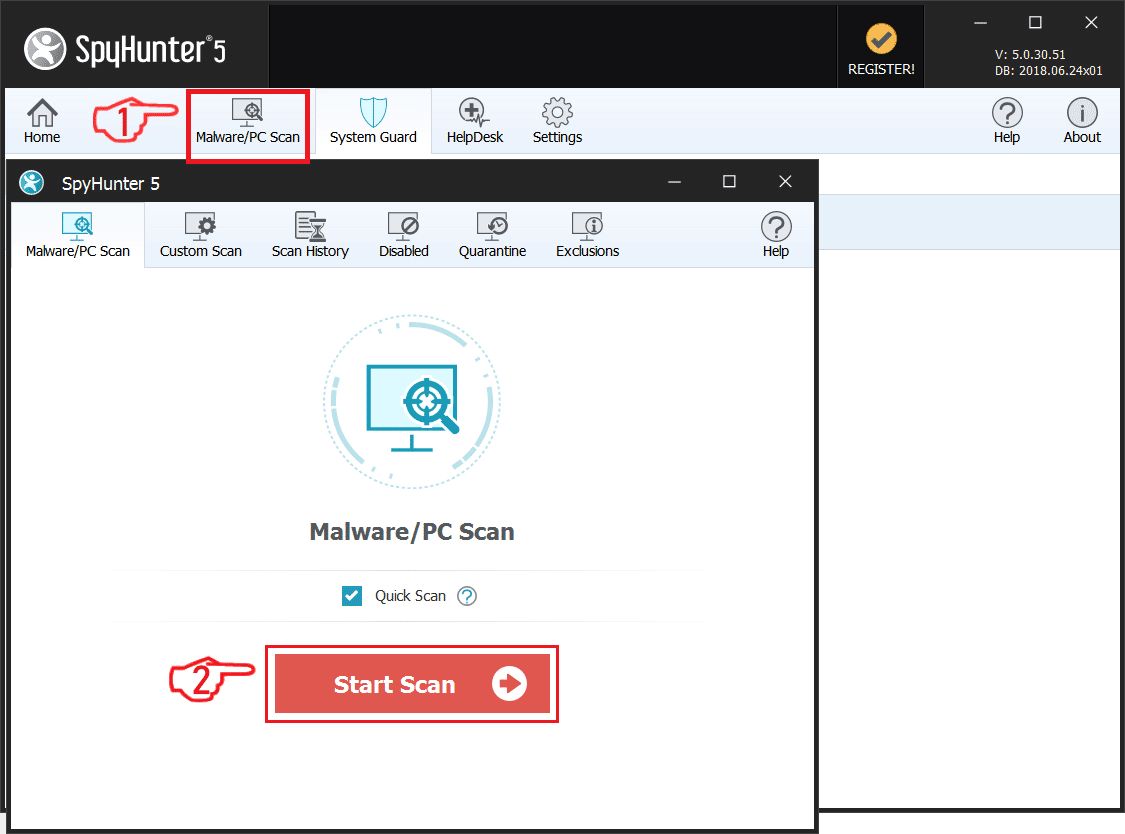
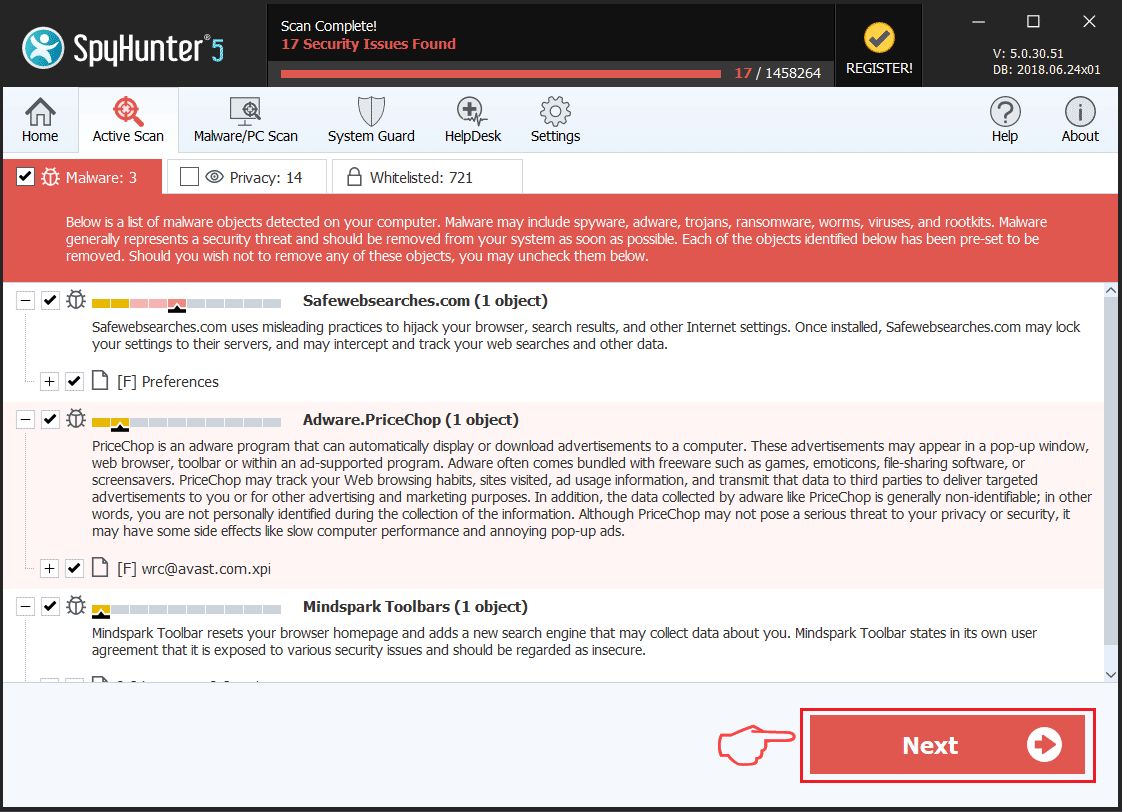
Ransomware Automatic Removal - Video Guide
Step 2: Uninstall Beni Oku.txt Virus and related malware from Windows
Here is a method in few easy steps that should be able to uninstall most programs. No matter if you are using Windows 10, 8, 7, Vista or XP, those steps will get the job done. Dragging the program or its folder to the recycle bin can be a very bad decision. If you do that, bits and pieces of the program are left behind, and that can lead to unstable work of your PC, errors with the file type associations and other unpleasant activities. The proper way to get a program off your computer is to Uninstall it. To do that:

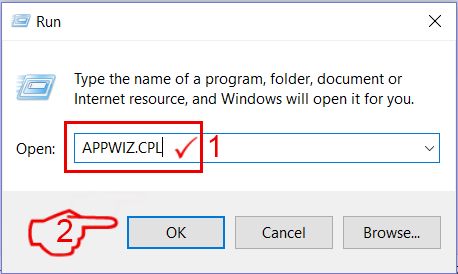
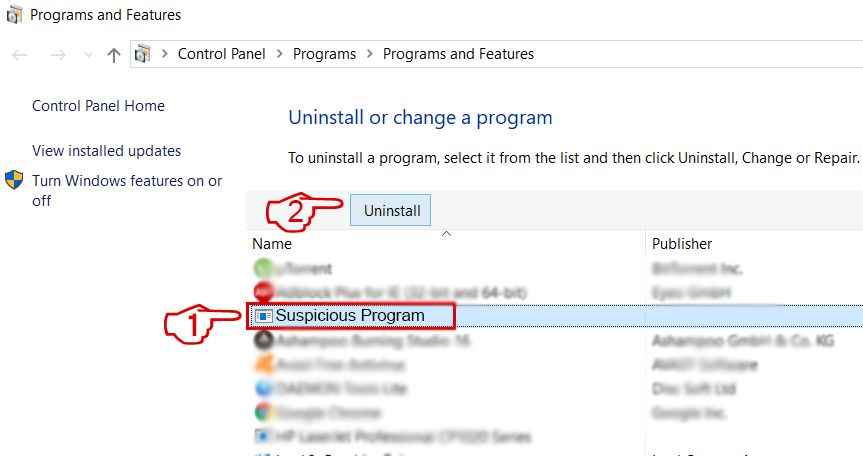 Follow the instructions above and you will successfully delete most unwanted and malicious programs.
Follow the instructions above and you will successfully delete most unwanted and malicious programs.
Step 3: Clean any registries, created by Beni Oku.txt Virus on your computer.
The usually targeted registries of Windows machines are the following:
- HKEY_LOCAL_MACHINE\Software\Microsoft\Windows\CurrentVersion\Run
- HKEY_CURRENT_USER\Software\Microsoft\Windows\CurrentVersion\Run
- HKEY_LOCAL_MACHINE\Software\Microsoft\Windows\CurrentVersion\RunOnce
- HKEY_CURRENT_USER\Software\Microsoft\Windows\CurrentVersion\RunOnce
You can access them by opening the Windows registry editor and deleting any values, created by Beni Oku.txt Virus there. This can happen by following the steps underneath:
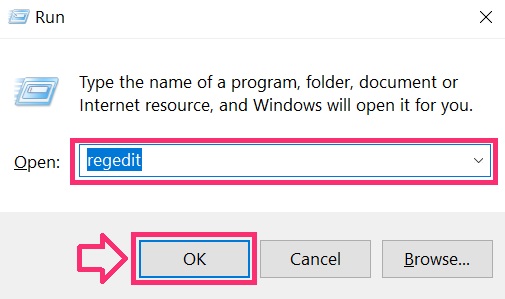

 Tip: To find a virus-created value, you can right-click on it and click "Modify" to see which file it is set to run. If this is the virus file location, remove the value.
Tip: To find a virus-created value, you can right-click on it and click "Modify" to see which file it is set to run. If this is the virus file location, remove the value.
Before starting "Step 4", please boot back into Normal mode, in case you are currently in Safe Mode.
This will enable you to install and use SpyHunter 5 successfully.
Step 4: Boot Your PC In Safe Mode to isolate and remove Beni Oku.txt Virus

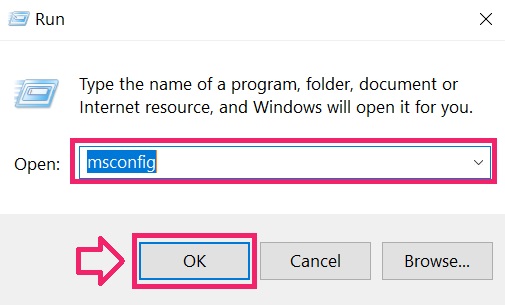
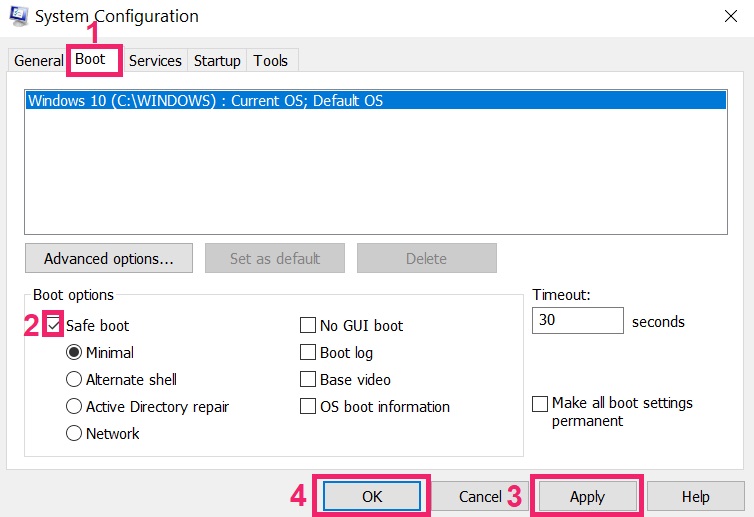
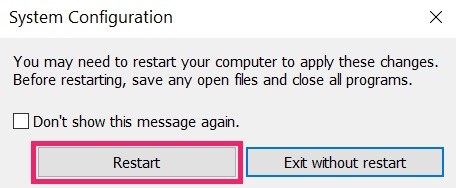
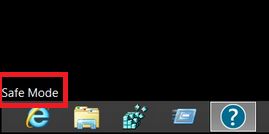
Step 5: Try to Restore Files Encrypted by Beni Oku.txt Virus.
Method 1: Use STOP Decrypter by Emsisoft.
Not all variants of this ransomware can be decrypted for free, but we have added the decryptor used by researchers that is often updated with the variants which become eventually decrypted. You can try and decrypt your files using the instructions below, but if they do not work, then unfortunately your variant of the ransomware virus is not decryptable.
Follow the instructions below to use the Emsisoft decrypter and decrypt your files for free. You can download the Emsisoft decryption tool linked here and then follow the steps provided below:
1 Right-click on the decrypter and click on Run as Administrator as shown below:
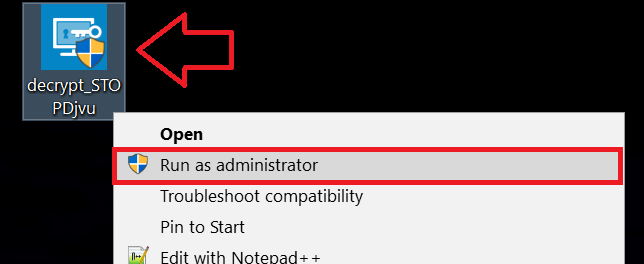
2. Agree with the license terms:
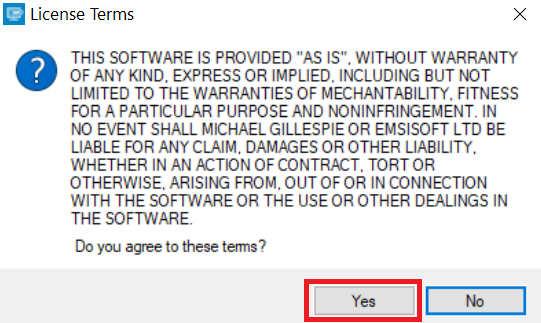
3. Click on "Add Folder" and then add the folders where you want files decrypted as shown underneath:
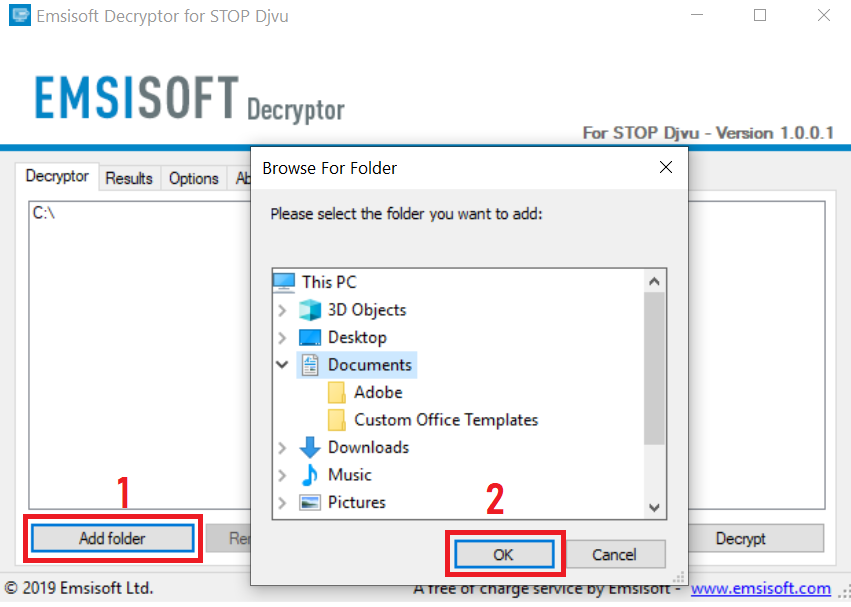
4. Click on "Decrypt" and wait for your files to be decoded.
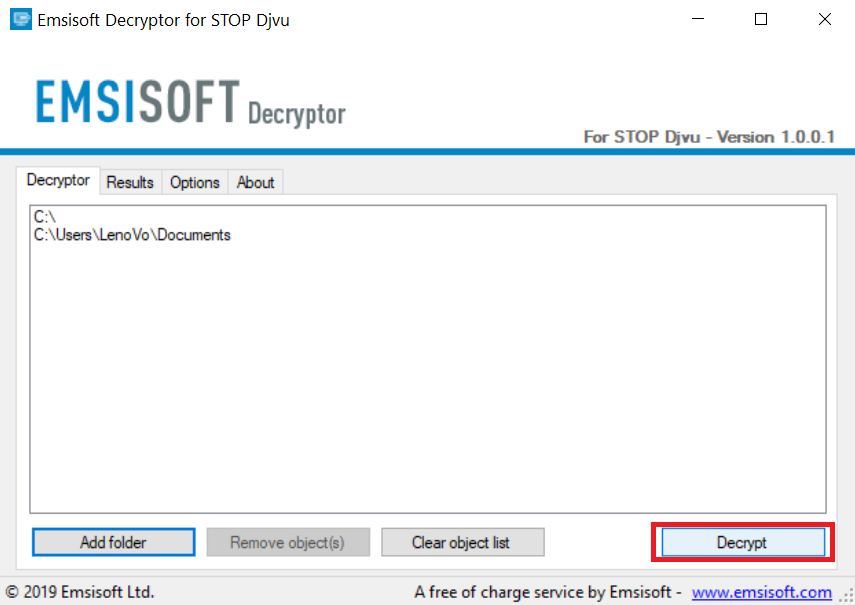
Note: Credit for the decryptor goes to Emsisoft researchers who have made the breakthrough with this virus.
Method 2: Use data recovery software
Ransomware infections and Beni Oku.txt Virus aim to encrypt your files using an encryption algorithm which may be very difficult to decrypt. This is why we have suggested a data recovery method that may help you go around direct decryption and try to restore your files. Bear in mind that this method may not be 100% effective but may also help you a little or a lot in different situations.
Simply click on the link and on the website menus on the top, choose Data Recovery - Data Recovery Wizard for Windows or Mac (depending on your OS), and then download and run the tool.
Beni Oku.txt Virus-FAQ
What is Beni Oku.txt Virus Ransomware?
Beni Oku.txt Virus is a ransomware infection - the malicious software that enters your computer silently and blocks either access to the computer itself or encrypt your files.
Many ransomware viruses use sophisticated encryption algorithms to make your files inaccessible. The goal of ransomware infections is to demand that you pay a ransom payment to get access to your files back.
What Does Beni Oku.txt Virus Ransomware Do?
Ransomware in general is a malicious software that is designed to block access to your computer or files until a ransom is paid.
Ransomware viruses can also damage your system, corrupt data and delete files, resulting in the permanent loss of important files.
How Does Beni Oku.txt Virus Infect?
Via several ways.Beni Oku.txt Virus Ransomware infects computers by being sent via phishing emails, containing virus attachment. This attachment is usually masked as an important document, like an invoice, bank document or even a plane ticket and it looks very convincing to users.
Another way you may become a victim of Beni Oku.txt Virus is if you download a fake installer, crack or patch from a low reputation website or if you click on a virus link. Many users report getting a ransomware infection by downloading torrents.
How to Open .Beni Oku.txt Virus files?
You can't without a decryptor. At this point, the .Beni Oku.txt Virus files are encrypted. You can only open them once they are decrypted using a specific decryption key for the particular algorithm.
What to Do If a Decryptor Does Not Work?
Do not panic, and backup the files. If a decryptor did not decrypt your .Beni Oku.txt Virus files successfully, then do not despair, because this virus is still new.
Can I Restore ".Beni Oku.txt Virus" Files?
Yes, sometimes files can be restored. We have suggested several file recovery methods that could work if you want to restore .Beni Oku.txt Virus files.
These methods are in no way 100% guaranteed that you will be able to get your files back. But if you have a backup, your chances of success are much greater.
How To Get Rid of Beni Oku.txt Virus Virus?
The safest way and the most efficient one for the removal of this ransomware infection is the use a professional anti-malware program.
It will scan for and locate Beni Oku.txt Virus ransomware and then remove it without causing any additional harm to your important .Beni Oku.txt Virus files.
Can I Report Ransomware to Authorities?
In case your computer got infected with a ransomware infection, you can report it to the local Police departments. It can help authorities worldwide track and determine the perpetrators behind the virus that has infected your computer.
Below, we have prepared a list with government websites, where you can file a report in case you are a victim of a cybercrime:
Cyber-security authorities, responsible for handling ransomware attack reports in different regions all over the world:
Germany - Offizielles Portal der deutschen Polizei
United States - IC3 Internet Crime Complaint Centre
United Kingdom - Action Fraud Police
France - Ministère de l'Intérieur
Italy - Polizia Di Stato
Spain - Policía Nacional
Netherlands - Politie
Poland - Policja
Portugal - Polícia Judiciária
Greece - Cyber Crime Unit (Hellenic Police)
India - Mumbai Police - CyberCrime Investigation Cell
Australia - Australian High Tech Crime Center
Reports may be responded to in different timeframes, depending on your local authorities.
Can You Stop Ransomware from Encrypting Your Files?
Yes, you can prevent ransomware. The best way to do this is to ensure your computer system is updated with the latest security patches, use a reputable anti-malware program and firewall, backup your important files frequently, and avoid clicking on malicious links or downloading unknown files.
Can Beni Oku.txt Virus Ransomware Steal Your Data?
Yes, in most cases ransomware will steal your information. It is a form of malware that steals data from a user's computer, encrypts it, and then demands a ransom in order to decrypt it.
In many cases, the malware authors or attackers will threaten to delete the data or publish it online unless the ransom is paid.
Can Ransomware Infect WiFi?
Yes, ransomware can infect WiFi networks, as malicious actors can use it to gain control of the network, steal confidential data, and lock out users. If a ransomware attack is successful, it could lead to a loss of service and/or data, and in some cases, financial losses.
Should I Pay Ransomware?
No, you should not pay ransomware extortionists. Paying them only encourages criminals and does not guarantee that the files or data will be restored. The better approach is to have a secure backup of important data and be vigilant about security in the first place.
What Happens If I Don't Pay Ransom?
If you don't pay the ransom, the hackers may still have access to your computer, data, or files and may continue to threaten to expose or delete them, or even use them to commit cybercrimes. In some cases, they may even continue to demand additional ransom payments.
Can a Ransomware Attack Be Detected?
Yes, ransomware can be detected. Anti-malware software and other advanced security tools can detect ransomware and alert the user when it is present on a machine.
It is important to stay up-to-date on the latest security measures and to keep security software updated to ensure ransomware can be detected and prevented.
Do Ransomware Criminals Get Caught?
Yes, ransomware criminals do get caught. Law enforcement agencies, such as the FBI, Interpol and others have been successful in tracking down and prosecuting ransomware criminals in the US and other countries. As ransomware threats continue to increase, so does the enforcement activity.
About the Beni Oku.txt Virus Research
The content we publish on SensorsTechForum.com, this Beni Oku.txt Virus how-to removal guide included, is the outcome of extensive research, hard work and our team’s devotion to help you remove the specific malware and restore your encrypted files.
How did we conduct the research on this ransomware?
Our research is based on an independent investigation. We are in contact with independent security researchers, and as such, we receive daily updates on the latest malware and ransomware definitions.
Furthermore, the research behind the Beni Oku.txt Virus ransomware threat is backed with VirusTotal and the NoMoreRansom project.
To better understand the ransomware threat, please refer to the following articles which provide knowledgeable details.
As a site that has been dedicated to providing free removal instructions for ransomware and malware since 2014, SensorsTechForum’s recommendation is to only pay attention to trustworthy sources.
How to recognize trustworthy sources:
- Always check "About Us" web page.
- Profile of the content creator.
- Make sure that real people are behind the site and not fake names and profiles.
- Verify Facebook, LinkedIn and Twitter personal profiles.


